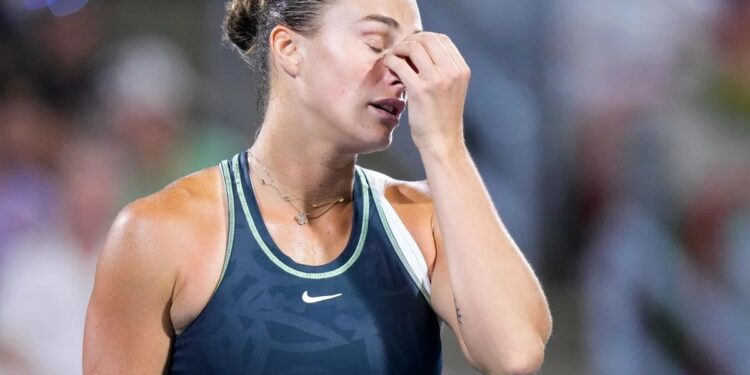Aryna Sabalenka’s WTA Finals Exit: World No. 1 Points to Coaching Missteps Amid Controversial Calls

Aryna Sabalenka’s 2024 season, marked by exhilarating highs and dramatic lows, took an unfortunate turn as she exited the WTA Finals after a series of narrow losses, a situation that left her visibly frustrated and even pointing fingers at her own coaching team.
Sabalenka’s early elimination wasn’t just a personal disappointment; it was riddled with tense moments, controversial calls, and highlighted the high-stakes atmosphere that has become a defining feature of her season.
With Sabalenka experiencing a rollercoaster year, the WTA Finals exit seems emblematic of the complexities she has faced as she strives to cement her legacy at the top of the game.
A Rollercoaster Season Defined by Dominance and Doubt
Sabalenka ascended to the coveted World No. 1 position earlier in 2024 after a year marked by breakthrough performances, particularly at Grand Slam tournaments and high-stakes international events. Yet, maintaining the top spot has proven to be an entirely different challenge, especially amid the backdrop of her rivalry with Iga Swiatek.
The year saw Sabalenka hit her stride at several points, but it also unveiled vulnerabilities that have reappeared in her game, sometimes unpredictably. Her emotional style on the court and her bold, unapologetic approach have garnered her a fervent fanbase, but it’s also subjected her to intense scrutiny.
As the WTA Finals kicked off in Cancun, fans anticipated a potential showdown between Sabalenka and Swiatek. While Swiatek managed a thrilling comeback win against Barbora Krejcikova in the group stages, Sabalenka’s journey took an entirely different trajectory.
Her opening matches were tightly contested, but a series of critical calls and tactical missteps saw her ousted, leaving fans and analysts dissecting what went wrong.
Coaching Frustrations Boil Over
After her unexpected elimination, Sabalenka was quick to highlight her dissatisfaction with her coaching strategy. In a pointed post-match press conference, she expressed disappointment with her team’s preparation for the tournament and hinted that their guidance during pivotal matches was less than effective.
“I don’t feel that I was given the best tools to handle what came at me during these matches,” Sabalenka stated. “This is the end-of-year finale, and there’s no room for tactical errors. I wish we had come in better prepared for the level of intensity.”
Critics argue that her comments may reflect an underlying issue within her camp, one that has potentially simmered beneath the surface for much of the season.
Despite Sabalenka’s public displays of loyalty and gratitude towards her team throughout the year, her remarks this time suggest a level of discord, as well as a belief that her struggles at the WTA Finals were exacerbated by factors beyond her control.
Some point to recent instances where Sabalenka seemed visibly frustrated on court, especially when under pressure, with some matches featuring mid-game outbursts directed at her coach’s box.
Her strong reaction has stirred debate among fans, with some defending her right to question her team’s methods while others feel that accountability should rest solely with the player.
In professional tennis, where a coach-player relationship can be as intimate as it is critical, Sabalenka’s statements resonate as a rare insight into the behind-the-scenes dynamics that accompany a star athlete.
Controversial Calls Heighten Tension
Adding fuel to the fire, Sabalenka’s matches at the WTA Finals were marred by a number of contentious line calls, decisions that arguably played a role in swinging the outcome of her encounters.
On several occasions, Sabalenka challenged calls that were confirmed in her favor after review, but these instances seemed to break her rhythm, often coming during pivotal moments in her matches.
While professional tennis players must navigate the inevitable fluctuations in officiating, some questioned whether Sabalenka’s opponents received an unintended advantage due to these inconsistencies.
Sabalenka made no secret of her frustrations with the officiating during her final match, stating, “It’s incredibly disheartening to play your heart out and have calls that disrupt the flow of the game.
I know these things happen, but this week felt especially tense.” While officiating issues are often part and parcel of high-stakes tournaments, her remarks hint at a cumulative frustration after a season marked by peaks and valleys.
Following her exit, social media became abuzz with debate over the role that officiating had in her performance, with some fans insisting that the line calls were a factor that disadvantaged Sabalenka more than her opponents.
Others, however, argue that top players must learn to compartmentalize such setbacks, viewing them as minor disruptions rather than game-changing obstacles.
Balancing Emotion and Focus: Sabalenka’s Public Persona Under the Microscope
Sabalenka’s emotional presence on the court has always been a double-edged sword. Her passionate reactions and expressive style contribute to her fan appeal, yet they can occasionally make her appear more vulnerable to mental lapses during high-pressure moments.
This year, Sabalenka’s competitive fire has both energized and polarized tennis fans; when she wins, her victory celebrations are full of charisma, but when she struggles, her expressions of frustration have sometimes led to criticism.
During the WTA Finals, Sabalenka’s reaction to each setback seemed amplified. At points, her body language conveyed her distress more strongly than her play, and moments of tension with her coaching box were apparent.
Fans noted her visible frustration between points, which some interpret as her wearing her heart on her sleeve, while others see it as an indication that she is sometimes too susceptible to emotional derailment.
However, Sabalenka has defended her approach, emphasizing that passion is integral to her identity as a player. In a statement earlier this season, she shared, “I’ve always been a fiery player.
If I stopped showing emotion, I wouldn’t be true to myself. I play with my heart, and sometimes that means I show my frustrations as well as my triumphs.”
The Road Ahead: What’s Next for Sabalenka?
As Sabalenka heads into the offseason, her WTA Finals exit will undoubtedly prompt a period of reflection for both herself and her team.
The outcome may lead to potential changes in her coaching staff or adjustments in strategy aimed at improving her mental resilience and match preparation.
With the 2024 season concluding, she has a rare opportunity to recalibrate her approach, ensuring that she maintains her position at the top.
For Sabalenka, the demands of staying at World No. 1 have revealed challenges that extend beyond the physical aspects of her game.
Her outspoken approach and visible expressions of passion make her a compelling figure in the world of tennis, but they also bring added scrutiny to her responses to adversity.
She now faces a critical juncture where adapting and refining her approach could mean the difference between sustaining her position at the top or ceding it to another rising star.
While fans await what’s next, one thing is clear: Sabalenka’s story as the World No. 1 is far from over.
Whether she emerges from this challenging period more resilient and refined or makes fundamental changes to her team and strategy, her path forward will continue to captivate.









